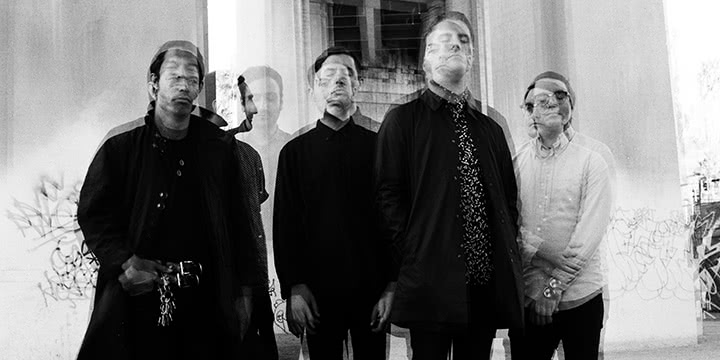Deafheaven’s inclusion on the 2016 Vivid LIVE bill is no accident, though the Californians’ stylistic orientation sets them apart from the majority of acts that have ever played the festival.
Splicing together black metal, shoegaze, hardcore and post-rock, Deafheaven are a unique phenomenon.
Against the odds, Deafheaven had a major breakthrough in 2013 with their second LP, Sunbather. While not accompanied by a hefty marketing campaign, it became the subject of lofty praise from critics and music lovers of all stripes, establishing the group as not just one of the more interesting contemporary rock bands, but an act that could break down boundaries in peoples’ taste. Sunbather garnered interest regardless of listeners’ existing genre allegiances – eliciting as much curiosity from Mayhem fans as those who prefer, say, Built To Spill. However, as vocalist George Clarke explains, it wasn’t Deafheaven’s objective to make a genre-thwarting album.
“Obviously we understood that what we were doing was combining a lot of different things into a melting pot of music,” he says, “but there was no political motivation. There was no, ‘We’re going to tear this down. We’re going to show people that you can do this and do this.’ It’s just the music we like and it’s the way we write songs. And that’s all we really are – we’re just songwriters and that’s how they come out. There’s not a whole lot of behind-the-scenes other than that.”
When Sunbather arrived, Deafheaven weren’t exactly newcomers – Clarke and guitarist Kerry McCoy started working on Deafheaven demos in 2009, and they signed with US punk and metal imprint Deathwish to release their 2011 debut, Roads To Judah. But prior to Sunbather’s unexpected explosion, Deafheaven were still relatively unknown, especially on this side of the planet. Last year’s New Bermuda gained a similar response, solidifying their position as one of the decade’s most critically acclaimed rock bands and opening up such opportunities as the Vivid LIVE gig. The exceptional nature of the band’s critical standing isn’t lost on Clarke.
“I think it’s very cool,” he says. “I’m very excited to play the Opera House, and any time a record gets praised it’s very appreciated. But I do think it is a bit of a pay-off as well – we’re a very hard-working band. We have not slowed down for the last few years, and I think people are seeing our work and it’s getting us places.”
Looking beyond which genre category Deafheaven ought to be listed under, their music is inherently challenging. This applies to New Bermuda perhaps even more so than Sunbather – the record includes just five songs, each between eight and ten minutes long, and all containing elaborate shifts in tone and texture and juxtaposing dynamics.
“We enjoy writing music that makes people think, and I’m glad that that’s the reaction these songs have received,” says Clarke. “Whether it be positive or negative, I think it’s important to create something that is satisfying in that way. But ultimately it’s just the way we write songs. We just like this kind of stuff and we like this kind of stuff, so we figure, why not put them together?”
It helps that Clarke and McCoy have a knack for blending their somewhat disparate interests. The history of popular music contains many instances of musicians haplessly merging incongruous stylistic elements (think Limp Bizkit, or Nelly’s recent ‘country hip hop’ offerings). But where the attempts of other acts have felt cheap, Deafheaven’s music is implicit of the members’ broad music tastes. Individual songs on New Bermuda, such as ‘Brought To The Water’ and ‘Come Back’, contain more musical deviations than some bands cover in an entire career, and listening far and wide plays an integral part in maintaining their creative versatility.
“Even though we’re using the influence of a lot of different styles, it can still feel stagnant,” Clarke says. “If our next album were to sound like New Bermuda or sound like Sunbather – even though those albums have a lot of different sounds in them – it would be boring. So it’s important to always listen to new music and think about music and what can work and what doesn’t and what would be a cool idea. If what you do is write music and perform music, you’re going to always try and find new ways to keep it fresh and keep it interesting to yourself.”
Along with releasing New Bermuda, Deafheaven’s touring schedule has been fairly unrelenting since their previous Australian visit in early 2014. They’ve now performed the songs from Sunbather countless times, and it’s starting to feel that way with the New Bermuda material. These aren’t compositions you can enter into lightly; both the heavy sections and the gentler sections require a real emotional investment, not to mention the gruelling physical task Clarke faces in summoning his freakish scream. But again, such practice comes naturally to the band.
“I feel energised by emotionally driven music, and I think that playing emotionally driven music keeps everyone at full throttle onstage. As long as it’s meaningful, we can keep up our pace. You just have to practise enough and perform enough to where running the marathon of our set doesn’t seem too strenuous anymore.
“Especially for an audience that’s there to see you, I think that’s important to put yourself in that space. It’s the one thing that we’re there to do, and it would be a disservice to everyone around us if we didn’t [go all the way].”
[Deafheaven photo byKristen Coffer]
New Bermuda is out now through Anti-/Warner. Deafheaven perform as part of Vivid LIVE 2016 at the Joan Sutherland Theatre, Sydney Opera House on Thursday June 2.


































